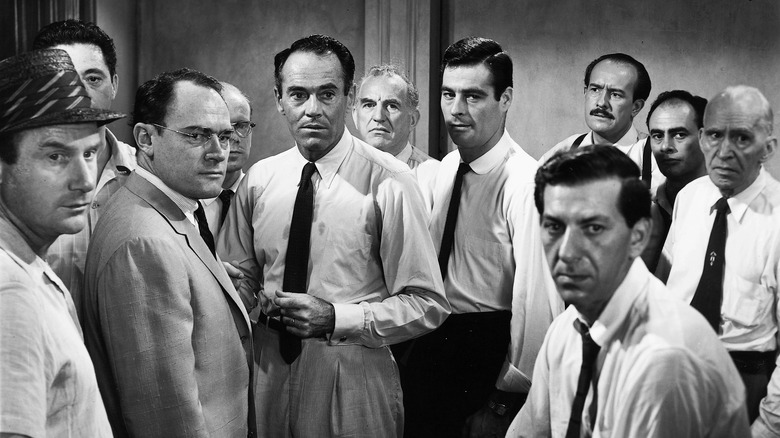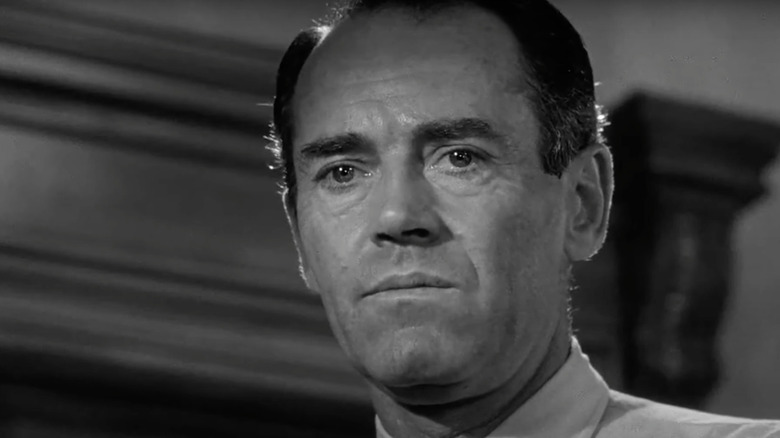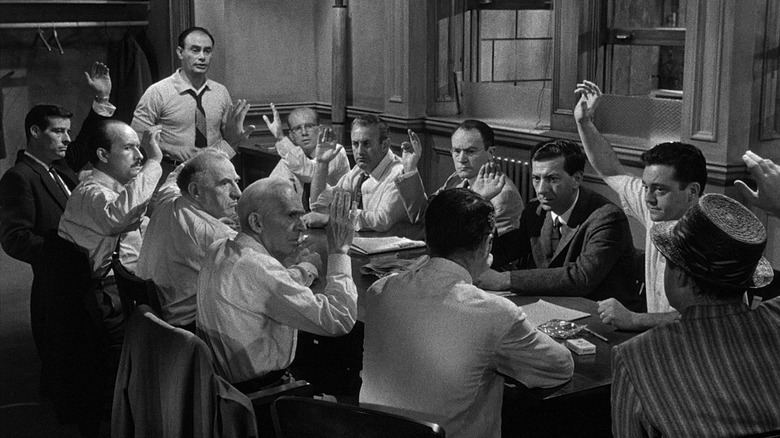Sidney Lumet Had A Simple Goal While He Was Making 12 Angry Men
Many of Sidney Lumet's movies have social themes. "Network" is an eerily prescient satire of corporate media and television as a vehicle for demagoguery. "Serpico" explores police corruption and the real-life assassination attempt on the incorruptible officer Frank Serpico. This political conscience goes right back to Lumet's debut, "12 Angry Men." This story about a hung jury in a murder trial isn't just a great ensemble drama, but a powerful testament to civic duty.
However, Lumet wasn't out to make a statement when directing "12 Angry Men," he was just trying to prove himself. The film's producers took a chance on Lumet, who had only theater and television credits to his name at the time, and he wasn't about to let them down and blow his big break in the process.
Lumet's big break
Interviewed by Marc Levin for the Director's Guild of America, Lumet recalled how he got his big break thanks to "12 Angry Men" producers Reginald Rose (who also wrote the film) and Henry Fonda (who also starred as the stalwart Juror #8):
"In this [theater] workshop I had downtown, we had about 40 people and about three were in the cast of 'Mister Roberts' which Fonda was in. When we did the year-end project, Hank came down to see it and was very impressed with the acting level, I had directed it. When Reggie brought my name up as a possible director for '12 Angry Men,' he was very enthusiastic about it. I would guess there's a real thanks to be given to Arthur Krim at United Artists because Arthur was never afraid to give directors their first movie. I don't know how many directors he gave their first movie to. He was wonderfully courageous in that way. He didn't hesitate for a minute when Hank and Reggie chose me."
Rose and Fonda taking a chance paid off. In the short term, "12 Angry Men," garnered all three men Oscar nominations. In the long term, it became a widely beloved classic and one of the dozen or so black-and-white films that non-movie junkies actually know of.
Though Lumet had never directed movies before, "12 Angry Men" was the perfect project for the skills he did have. It was a small-scale film, taking place almost entirely in one room and reliant on the actors' performances. As a theater director, Lumet knew how to use a limited space to its fullest and direct great performances. At the same time, his work in television meant he knew how to work a camera and block actors in front of it.
Lumet's feelings on the message
In 2008, Lumet was interviewed by Daniel Anker; the interview only saw the light of day in 2015, released as "By Sidney Lumet." During the interview, Lumet revealed an indifference to the messages of "12 Angry Men." As he said:
"If you asked me specifically, 'When you did '12 Angry Men,' were you interested in the justice system?' Absolutely not, I was interested in doing my first movie, and I was very impressed that Henry Fonda wanted me as the director because he had seen something I had done off Broadway. It was the most obvious motive! '12 Angry Men,' I think it changed the law in England — great! That isn't why I did it. I wasn't out to change the law in England."
That wasn't the only real-world impact of "12 Angry Men." Sonia Sotomayor, Associate Justice of the U.S. Supreme Court, has said that seeing "12 Angry Men" in high school helped her choose to become a lawyer. "I had never thought about the juries and their function until I saw this movie," Justice Sotomayor said. "This was my very first inspiration. When the watchmaker in that scene talked about the greatness of democracy being the jury system? It sold me."
Still, Lumet was probably most proud of "12 Angry Men" in that it allowed him to direct more movies. The man adored his job — every word of his book, "Making Movies," radiates pure, unpretentious love for filmmaking. Even so, the book isn't lacking for candor; directing may be the best job in the world, but it is a job. Based on that and these interviews, it appears that Lumet never let go of his initial, simple goal even after he finished directing "12 Angry Men."


